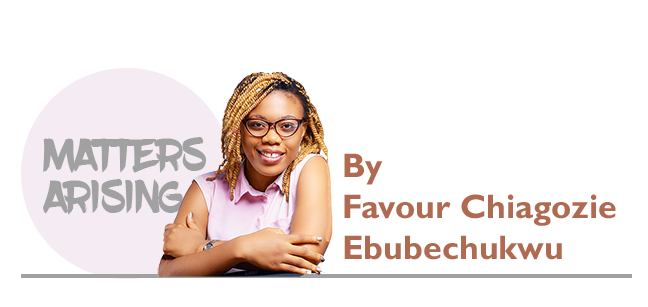Conversations about the breast of a woman seem to be a very exciting and tickling one, especially for the men, when it is being discussed or debated in their favour.
Last week on The Morning Show programme, aired on Arise TV, consisting of Dr. Reuben Abati, Kachi Offiah, Rufai Oseni, and Adesuwa Omoruan, the statement made by the Commissioner for Gender Affairs in Enugu state – Hon. Peace Nnaji, stirred their discussion on exclusive breastfeeding. The commissioner had urged women, during the breastfeeding week, to engage in exclusive breastfeeding and to reserve their breast milk for their babies, not their husbands.

In turns of submission, Dr. Abati reacted to the ‘politicisation of the breast’, a concept he explained to be a point of conflict between fathers and their babies on the accessibility to the breast. His explosive pronunciation of certain words and his descriptive facial and bodily expressions portrayed the fervency of his words. He stated that the importance of exclusive breastfeeding should have been the context in which the Commissioner stayed in; rather than digressing to the ‘politicisation of the breast’. In a sense of comic defence, he referred to a piece of advice from a Chief Nursing Sister in Lagos, Ms. Roseline Oladimeji, about pregnant women allowing their husbands to suck their breasts to prepare them for breastfeeding after delivery. He also cited a book by Desmond Moris titled ‘The Naked Ape’ to defend that the woman’s breast is a source of comfort, not conflict; and that to some men, it is a source of joy and happiness. His paralanguage, as expected, triggered amusement in the viewers.
Moving from Dr. Abati’s opinionated, informative, and humourous submission, Mr. Rufai took his stance on the aspect of body shaming. He pointed to the unpleasant increase in breast implants on women (some, of childbearing age) for the sake of having an ideal sexual-appealing breast shape. Both Kachi and Rufai made it clear that women should be proud of their breasts and no one should body shame them. Dr. Abati, still in his descriptive mood, said that women’s breasts come in different sizes and shapes; therefore, no one should be body shamed. Adesuwa extended his point with the reminder that men, too, come in different sizes and shapes. It was another humourous and informative juncture to sensitise the masses against body shaming and encourage exclusive breastfeeding amongst women.
Weighing the reality of our society, to merely utter that no one should body-shame anyone is like instructing a running tap to stop running.
A word is easier said than enforced. In a society where it is a trend to nail women’s breasts to an ideal cross of sexual appeal through objectification in forms of music, shows, and words; in a society where it is okay for a video of a lady being harassed by an adult male taping her butt publicly without any sense of caution- a society where such video is ignored and ridiculed with statements like: “why did she dress like that?” “she deserves it”, coming not only from the stereotyped masses, but also from people of high social standing; in a society where ‘boobs’ is the accurate word for a firm breast and ‘slippers’ a labelling word for a slacked breast; in a society where men are proud to become fathers but ashamed to esteem the breast that fed the child, are we not, by ourselves, tarnishing the noble idea of exclusive breastfeeding?
Do we not, by our unsifted permission of what is ‘funny’, ‘lit’, ‘dope’, and certain ‘tongue-in-cheek’ statements, fan the sparks of body shaming to flame? We now have women who quiver at the thought of their bodies being ridiculed; thus, they neglect the practice of exclusive breastfeeding to avoid the “getting fat” and “slacked breast” label.
It then appears as though those who practice it are people with no interest in sexual appeal. Some settle with a poor image of their bodies. Others bear the burden of breast surgery.
Weighing the reality of our society, to merely utter that no one should body-shame anyone is like instructing a running tap to stop running. Of course, until an active action is taken to turn the valve of the tap against the flow, nothing happens. Similarly, when we make the ‘should’ statement without a ‘rule’, we will continue the circle of repetitive conversations. But if we back up what no one should do by turning the valve of our legal rule against the persistent flow of body shaming, we will achieve, to a large extent, the aim of the exclusive breastfeeding campaign: to get more mothers into this noble practice.
♦ Favour Chiagozie Ebubechukwu is an Editorial Staff Writer and columnist with the WAP
- Anambra 2025 Governorship Election Might Be an Open Contest - April 24, 2024
- Anambra Assembly Passes Bill To Prohibit Secret Cults - April 24, 2024
- 2024 Aguata NBA Law Week: AG, Prof. Ifemeje Touts Landmarks and Expectations - April 19, 2024

